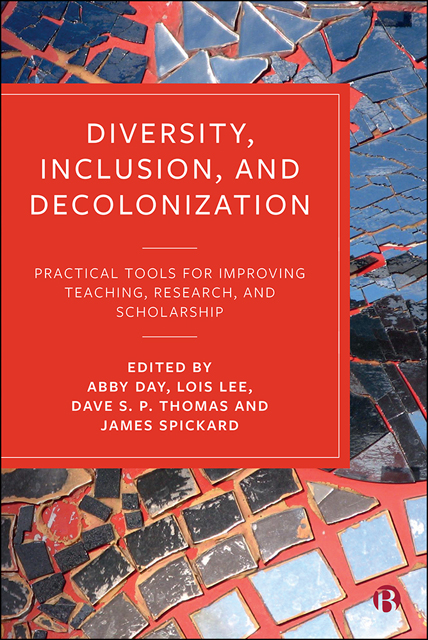 Diversity, Inclusion, and Decolonization
Diversity, Inclusion, and Decolonization Book contents
- Frontmatter
- Contents
- List of Figures and Tables
- Notes on Contributors
- Acknowledgements
- Typographical Note
- Introduction: Why Diversity, Inclusion, and Decolonization Matter
- Part I Changing Universities
- Part II Diversifying Curricula
- Part III Diversifying Research and Scholarship
- Part IV Overcoming Intellectual Colonialism
- Epilogue: What We Have Learned
- Index
15 - Decolonial Praxis beyond the Classroom: Reflecting on Race and Violence
Published online by Cambridge University Press: 13 October 2022
- Frontmatter
- Contents
- List of Figures and Tables
- Notes on Contributors
- Acknowledgements
- Typographical Note
- Introduction: Why Diversity, Inclusion, and Decolonization Matter
- Part I Changing Universities
- Part II Diversifying Curricula
- Part III Diversifying Research and Scholarship
- Part IV Overcoming Intellectual Colonialism
- Epilogue: What We Have Learned
- Index
Summary
Introduction
In the aftermath of the 2020 Black Lives Matter protests in the US, a US-based colleague and I discussed the implications of anti-racism protest for classroom practices in human and social sciences. As two scholars of colour, we recognised our shared deep desire to make space and to honour the embodied experience of our students as they shared an experience of racialised violence that stretched across the Atlantic. We also noted our shared despair and pessimism that this had happened before and would happen again. For us, it raised questions about how to teach our students to be alert to the seriousness of this moment – this violence, directed at their bodies and their sense of belonging in the world – while also teaching them to arm themselves for the stubborn persistence of white supremacy.
For me as a scholar of colour, it often feels that I conduct my teaching in a context of violence. As Katherine McKittrick reminds us, ‘learning and teaching and classrooms are, already, sites of pain. … [T] he site where we begin to teach is already white supremacist’ (Hudson and McKittrick, 2014, p 238). While faculty of colour understand that teaching in such spaces is physically taxing and emotionally draining, students of colour don’t always recognise this as violence but, rather, consider their sense of bewilderment and disorientation as natural, and expect that it will be soothed by institutional mechanisms of incorporation such as O-week (student orientation) or Freshers’ Week. In the opening pages of On Being Included, Sarah Ahmed asserts that we need to think ‘more concretely about institutional spaces, about how some more than others will be at home in institutions that assume certain bodies as their norm’ (Ahmed, 2012, p 3). In this Ahmed calls us to a simultaneous examination of the institutional cultures as well as the embodied experiences of those persons not considered the norm.
At the university where I teach (University of KwaZulu-Natal [UKZN]), this period of orientation at the beginning of the academic year is often followed by periods of disruption and student protests as another cohort of students questions the purpose of the university and the white normative culture that is associated with higher education.
- Type
- Chapter
- Information
- Diversity, Inclusion, and DecolonizationPractical Tools for Improving Teaching, Research, and Scholarship, pp. 236 - 250Publisher: Bristol University PressPrint publication year: 2022


